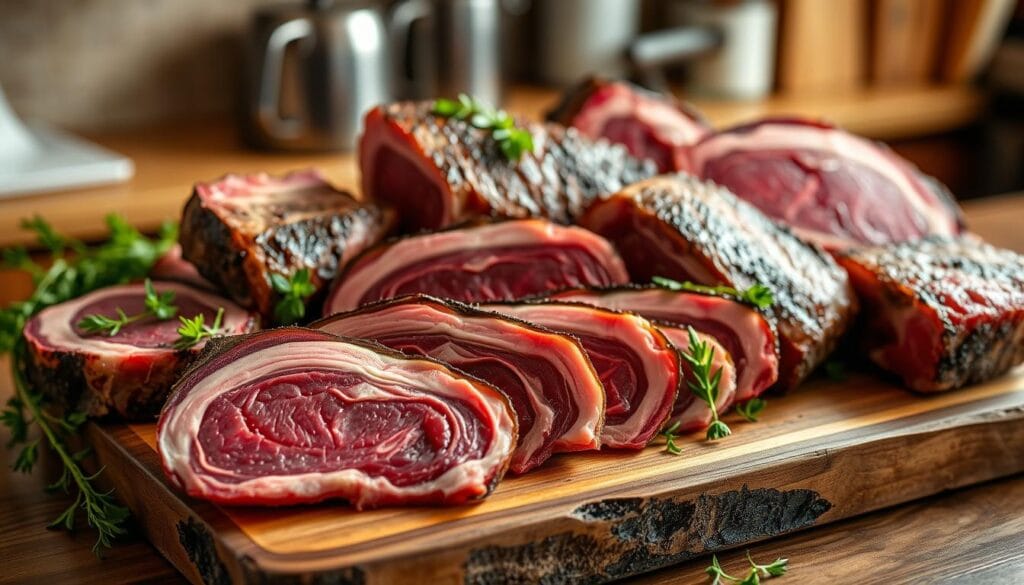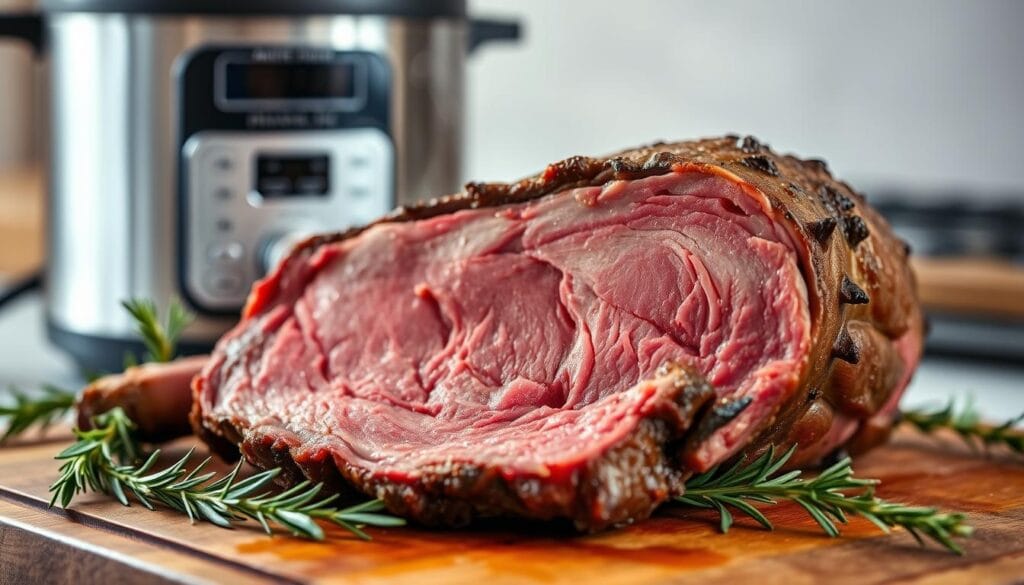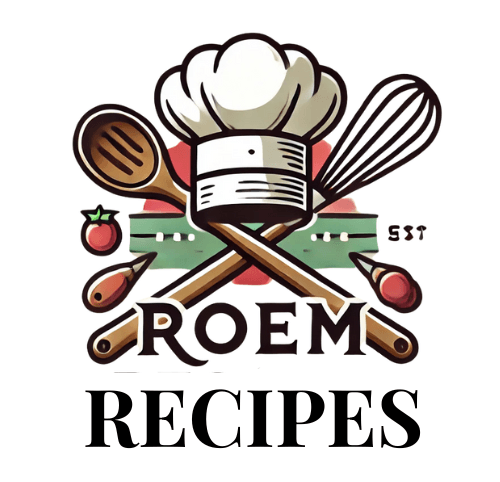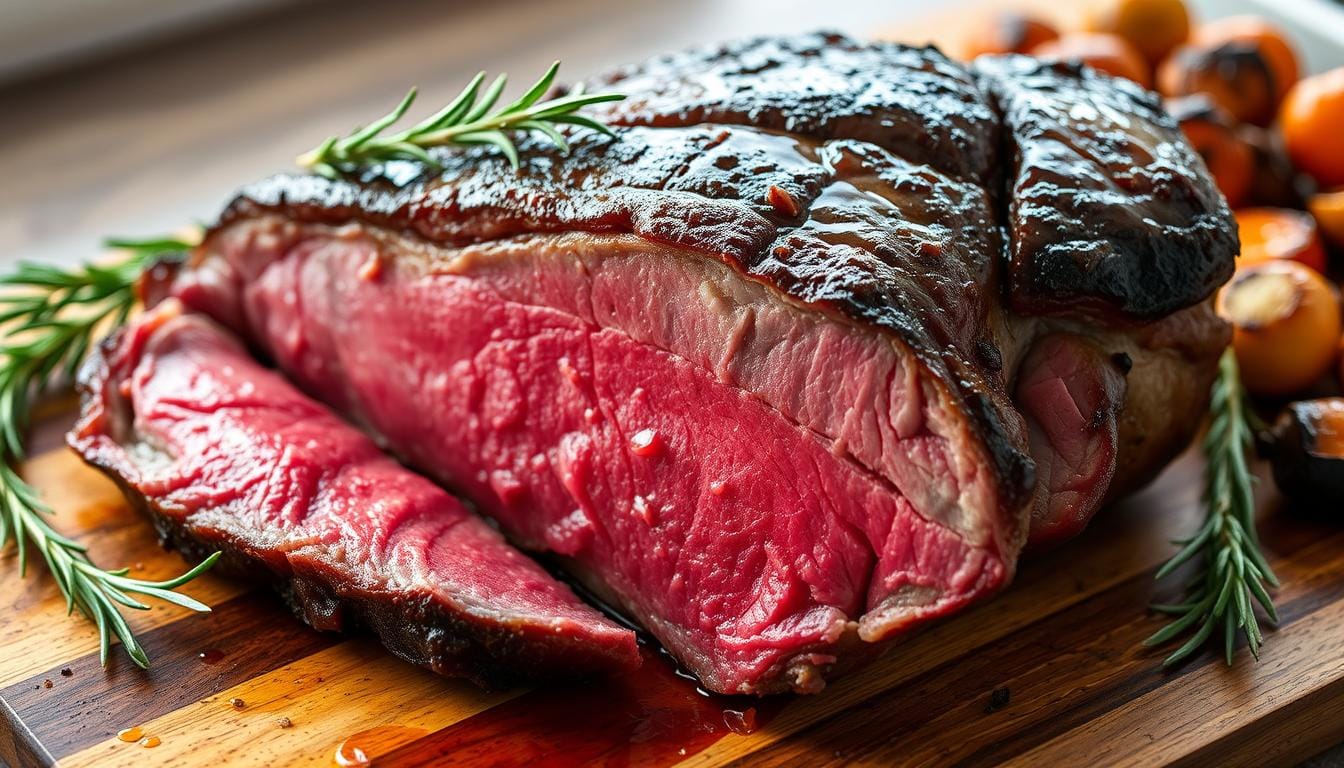Every holiday season, I’ve dreamed of making the ultimate prime rib roast. I wanted it to make my family’s eyes light up with excitement. After years of trying different roasting methods, I found sous vide prime rib. It turns this luxurious cut into a true culinary masterpiece.
The sous vide prime rib roast is more than just a cooking method. It’s a culinary revolution. It lets you control temperature and cooking time perfectly. This makes the prime rib tender and flavorful, something traditional roasting can’t match. Whether you’re a home cook or a chef, this recipe will take your cooking to new heights and impress everyone.
Imagine cutting into a prime rib roast that’s perfectly cooked all the way through. It’s juicy and melts in your mouth, something ovens can’t do. Sous vide cooking is the magic that makes this happen. It ensures you get restaurant-quality results every time.
Key Takeaways
- Sous vide guarantees perfectly consistent cooking temperatures
- Achieve unparalleled tenderness with precise heat control
- Eliminates the risk of overcooking or uneven doneness
- Transforms prime rib into a gourmet dining experience
- Provides foolproof results for home cooks of all skill levels
Understanding Prime Rib: The Ultimate Holiday Roast
Prime rib is the top choice for beef lovers, making any dinner special. Learning how to cook it sous vide is key to getting it just right.
What Makes Prime Rib Special
Prime rib comes from the cow’s rib section, ribs six through 12. It’s famous for its marbling, which makes it tender and flavorful. Sous vide cooking can make this cut even better.
- Originates from ribs 6-12 of the cow
- Contains extensive fat marbling
- Offers exceptional flavor and tenderness
Bone-in vs. Boneless Prime Rib
Choosing between bone-in and boneless prime rib depends on your taste. Bone-in roasts are often more flavorful and keep moisture in.
| Characteristic | Bone-in Prime Rib | Boneless Prime Rib |
|---|---|---|
| Flavor Intensity | Higher | Moderate |
| Moisture Retention | Excellent | Good |
| Carving Difficulty | More Complex | Easier |
Choosing the Perfect Cut
When picking your prime rib, keep these tips in mind for sous vide cooking:
- Plan for about 1 pound per person
- Choose USDA grades: Prime, Choice, or Select
- Check the fat marbling for tenderness
- Opt for roasts between 5-16 pounds

“Selecting the right prime rib is the first step to a memorable dining experience” – Professional Chef
Why Sous Vide Prime Rib Roast Is Superior

Cooking a juicy sous vide prime rib makes your holiday roast truly special. The sous vide method changes the game by offering unmatched precision and consistency. Every slice is perfect.
Sous vide cooking tips show why it’s better than traditional roasting:
- Precise temperature control for edge-to-edge perfection
- Guaranteed consistent doneness throughout the entire cut
- Moisture retention that traditional methods can’t match
- Elimination of overcooking risks
Choosing sous vide for your prime rib means using a temperature-controlled water bath. It cooks your meat with unmatched accuracy. You get exactly the temperature you want, without any guesswork.
“Sous vide transforms cooking from an art to a science, giving you restaurant-quality results every time.” – Professional Chef
Traditional roasting can lead to uneven doneness. Sous vide fixes this by keeping a constant temperature. This allows enzymes to break down tissues while keeping the meat juicy.
| Cooking Method | Consistency | Moisture Retention | Precision |
|---|---|---|---|
| Traditional Oven | Uneven | Moderate | Low |
| Sous Vide | Perfect | Excellent | High |
The secret to a perfect prime rib is mastering sous vide cooking. This method ensures a tender, flavorful roast. It will wow even the pickiest dinner guests.
Essential Equipment for Sous Vide Prime Rib
To make the perfect sous vide prime rib, you need special tools. Start by picking the right equipment for precise temperature control and great results. Professional sous vide cooking techniques require careful tool selection.
Choosing the Right Immersion Circulator
First, invest in a reliable immersion circulator. Here are some top picks:
- Breville Joule Turbo – The fastest sous vide machine available
- Anova Culinary Sous Vide Precision Cooker – Known for consistent performance
- Mid-range models around 1000 watts for optimal cooking power
Selecting the Perfect Cooking Container
You’ll also need a big container for even heat. Consider these options:
- 4.75-gallon Cambro container – Accommodates multiple cuts
- Large stockpot as an alternative
- Dedicated sous vide containers with marked measurements
Essential Accessory Toolkit
Complete your sous vide setup with these tools:
- Heavy-duty zipper-lock freezer bags
- Digital meat thermometer
- Long cooking tongs
- Pot-lid organizer for bag separation
“The right equipment transforms home cooking into a professional culinary experience.”
Quality sous vide equipment means consistent, restaurant-grade prime rib. Remember, top-notch immersion circulators are now under $250.
Preparing Your Prime Rib for Sous Vide
Getting your prime rib ready for sous vide cooking is all about the details. You aim to turn this top-notch cut into a dish that will wow everyone. It’s a chance to create a culinary masterpiece.
“The secret to perfect sous vide prime rib is in the preparation” – Professional Chef
Begin with a prime cut of meat. Then, focus on three main steps: trimming, seasoning, and bagging.
- Trim excess fat, leaving about 1/4 to 1/2 inch fat cap
- Pat the roast completely dry with paper towels
- Season generously with kosher salt and black pepper
- Consider additional herbs like rosemary or thyme
Seasoning is key when cooking prime rib sous vide. It’s best to salt your roast 24 to 96 hours before. This step boosts flavor and keeps the meat moist.
| Preparation Step | Time Required | Key Considerations |
|---|---|---|
| Trimming | 10 minutes | Remove excess fat, keep 1/4-1/2 inch fat cap |
| Seasoning | 5-10 minutes | Use kosher salt, pepper, and optional herbs |
| Bagging | 5 minutes | Use vacuum seal or water displacement method |
Pro tip: Prepare the roast in the bag a day before. This lets flavors soak into the meat and makes cooking easier.
Prime Rib Roast Sous Vide Temperature Guide
To cook a perfect prime rib roast sous vide, you need to control the temperature well. Knowing the right temperature and cooking time is key to getting it just right, like in a restaurant.
Doneness Temperature Ranges
Each level of doneness needs a specific temperature. Here’s a guide to help you cook your prime rib to perfection:
- Rare: 120-129°F
- Medium Rare: 130-134°F
- Medium: 135-144°F
- Medium Well: 145-154°F
- Well Done: 155-164°F
Cooking Time Considerations
The best temperature for prime rib’s tenderness is between 105°F and 122°F. Cooking times can vary based on the size and initial temperature of your roast.
“Medium Rare is the most popular serving temperature for prime rib in restaurants.”
Temperature Safety Tips
Food safety is very important when cooking sous vide. The water bath at 136°F kills salmonella in about 80 minutes for fatty tissues. Always use a meat thermometer to check the internal temperature.
| Cooking Stage | Temperature | Duration |
|---|---|---|
| Initial Low-Temp Alarm | 130°F | Monitoring |
| Final Internal Temperature | 133°F | After Cooking |
| Post-Bath Broiling | N/A | 4-8 minutes |
Remember, you can adjust cooking times by up to 5°F without affecting the doneness of your prime rib roast.
Seasoning and Aromatics for Maximum Flavor
Creating the best prime rib recipe starts with the right seasonings and aromatics. Your sous vide prime rib will become extraordinary with the right herbs and spices. These enhance its natural rich flavor.
Fresh herbs are key for an exceptional prime rib. Here are some classic flavor combinations:
- Rosemary and thyme – classic herb pairing
- Fresh garlic and cracked black pepper
- Dijon mustard for tangy depth
- Lemon zest for bright, citrusy notes
When making your sous vide prime rib, use high-quality, fresh ingredients. Fresh herbs from your garden or local market are better than dried ones. They offer vibrant flavors.
| Herb/Spice | Flavor Profile | Recommended Quantity |
|---|---|---|
| Fresh Rosemary | Woody, Pine-like | 2-3 sprigs |
| Fresh Thyme | Earthy, Slightly Minty | 4-5 sprigs |
| Garlic | Pungent, Robust | 4-6 cloves, minced |
| Sea Salt | Enhances Meat Flavor | 1-2 tablespoons |
Pro tip: Let your seasoned roast rest with herbs for at least 4 hours before cooking. This lets flavors penetrate deeper. So, every bite is full of delicious aromatics.
“The right seasoning transforms a good cut of meat into an unforgettable culinary experience.” – Professional Chef
Step-by-Step Sous Vide Process
Learning to cook prime rib sous vide needs focus and care. This guide will show you how to cook the perfect prime rib roast using sous vide techniques.
Water Bath Preparation
Getting your water bath ready is key for sous vide cooking. Start by picking an immersion circulator and a big container for your rib roast. Here’s what to do:
- Fill the container with warm tap water
- Attach the immersion circulator
- Set the precise temperature according to your desired doneness
- Allow the water to fully preheat before adding the roast
Sealing Techniques
Sealing your prime rib right keeps it moist and tasty. You can use two main methods:
- Vacuum Sealing
- Removes all air from the bag
- Provides the most airtight seal
- Water Displacement Method
- Ideal for home cooks without a vacuum sealer
- Gradually submerge the bag to push out air
Cooking Duration Guidelines
| Desired Doneness | Temperature | Cooking Time |
|---|---|---|
| Rare | 129°F | 3-4 hours |
| Medium-Rare | 135°F | 4-5 hours |
| Medium | 140°F | 5-6 hours |
“Patience is the secret ingredient in sous vide cooking. Take your time, and you’ll be rewarded with perfectly cooked prime rib every time.” – Professional Chef
Sous vide cooking offers great flexibility. Your prime rib can stay in the water bath for 1-2 more hours without losing quality. This extra time helps you prepare side dishes and add finishing touches.
The Perfect Sear: Finishing Your Roast
After sous vide cooking, getting the perfect sear is key. It turns your meat into a restaurant-quality dish. Follow these sous vide tips to get a golden-brown crust that’s juicy inside.
There are several ways to get the perfect sear:
- Oven Searing: Preheat to 500°F (260°C)
- Cast Iron Skillet: Use high heat for quick searing
- Culinary Torch: For precise browning
“The key to an exceptional sear is a completely dry surface and scorching hot cooking surface.” – Professional Chef
Before searing, dry your roast with paper towels. This step is crucial for a crisp crust. When you sear your sous vide prime rib, aim for a quick, intense sear. This should last 15-20 minutes to get a rich, caramelized exterior without overcooking the inside.
| Searing Method | Temperature | Duration |
|---|---|---|
| Oven Searing | 500°F | 15-20 minutes |
| Cast Iron Skillet | 550°F | 2-3 minutes per side |
| Culinary Torch | Direct flame | 30-45 seconds |
After searing, let your roast rest for 10-15 minutes. This lets the juices redistribute, making each slice juicy and perfectly cooked. Remember, patience is key for the ultimate prime rib experience.
Making Restaurant-Quality Au Jus
Creating the perfect au jus is key to making your sous vide meat recipes stand out. The liquid from your prime rib cooking has amazing flavor. It can turn your best prime rib recipe into a dish fit for a restaurant.
Extracting Bag Juices
After cooking your prime rib sous vide, take it out of the bag carefully. Strain the juices through a fine-mesh sieve to get rid of solids. This makes sure your au jus is clean and pure.
Flavor Enhancement Techniques
Make your au jus into a gourmet sauce with these ingredients:
- Red wine (1/4 cup)
- Worcestershire sauce (2 tablespoons)
- Fresh herbs like thyme or rosemary
- Minced garlic
“The secret to a remarkable au jus lies in the quality of your ingredients and the depth of flavors you can develop.”
Quick Au Jus Preparation
Your au jus can be ready in just 5 minutes. Mix the strained juices with other ingredients in a small saucepan. Simmer for 2-3 minutes to mix the flavors. You’ll get a rich, savory sauce that goes great with your prime rib.
Pro tip: This sauce makes about 2 cups and can be stored in the fridge for up to 5 days. It’s a great addition to your cooking collection.
Serving and Presentation Tips
Creating a stunning sous vide prime rib roast is more than just cooking. It’s about making a dish that will wow your guests. The key is in how you present it.
- Ask your butcher to french the rib bones for a fancy look
- Let the roast rest for 10-15 minutes before carving
- Slice it between 1/2 to 3/4 inch thick for the best texture
- Always cut along the meat’s grain for even slices
“A beautifully presented prime rib is the centerpiece of any memorable meal.”
Your sous vide prime rib roast is very versatile. Here are some great sides to try:
| Accompaniment | Flavor Profile |
|---|---|
| Horseradish Sauce | Sharp, Zesty |
| Au Jus | Rich, Meaty |
| Roasted Vegetables | Earthy, Complementary |
| Yorkshire Pudding | Classic, Traditional |
For a fancy look, add garnishes like fresh herbs or edible flowers. They make your prime rib roast look even better. Remember, how you present your dish is just as important as how you cook it.
Storage and Reheating Guidelines
Keeping your sous vide prime rib’s flavor top-notch is key. Follow sous vide cooking tips to enjoy it for weeks or months. Proper handling is crucial.
- Transfer meat to airtight containers within 2 hours of cooking
- Store in refrigerator for up to 4 days
- Use vacuum-sealed bags for extended preservation
- Add a small amount of au jus to prevent moisture loss
“Proper storage is the secret to maintaining that perfect sous vide tenderness.” – Professional Chef
Reheating your prime rib is easy with sous vide. Here’s how to do it right:
| Reheating Method | Temperature | Time | Moisture Retention |
|---|---|---|---|
| Sous Vide | 132°F (55.5°C) | 1 hour | 100% |
| Oven | 250°F | 20-30 minutes | 80% |
| Air Fryer | 225°F | 10-15 minutes | 75% |
To freeze, vacuum-seal your prime rib with au jus. It can last up to 6 months. Thaw it in the fridge overnight before reheating.
FAQ
What makes sous vide cooking better for prime rib compared to traditional roasting?
How long should I cook prime rib using the sous vide method?
Can I prepare the prime rib in advance using sous vide?
What equipment do I need to cook prime rib sous vide?
How do I achieve the perfect crust on a sous vide prime rib?
What are the recommended temperatures for different levels of doneness?
How should I store and reheat leftover prime rib?
Should I leave the bone in or remove it before cooking?
What are the best seasonings for sous vide prime rib?
Conclusion
Your journey with prime rib roast sous vide has shown you a new way to cook. This method ensures your dishes are always top-notch. You’ve learned to make a simple roast into a special meal with ease.
The sous vide method gives you full control over the temperature and doneness. This means your prime rib is always cooked just right, from start to finish. It’s a game-changer, cutting cooking time in half and ensuring perfect results every time.
This technique isn’t just for prime rib. It can be used for many types of meat, expanding your cooking possibilities. With sous vide, you can cook like a pro without the hassle. It’s a favorite among home cooks, with 85% of them loving the results.
Now that you know how to cook prime rib sous vide, you’re ready for more. Dive into the world of sous vide cooking. Enjoy the precision and flavors it brings to your meals. Your cooking skills will never be the same.

